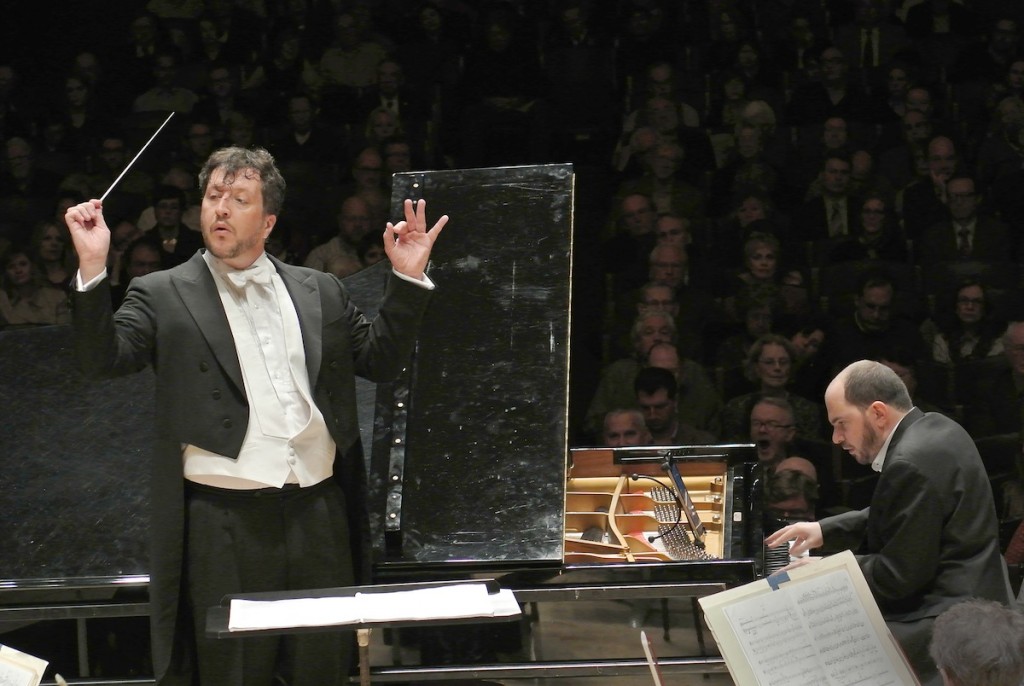Adès conducts Adès in a mixed BSO program

Thomas Adès leads the BSO in his "In Seven Days," featuring pianist Kirill Gerstein. Photo: Stu Rosner
For those who regularly take the temperature of symphony orchestras, it’s a good sign when a younger-than-usual crowd turns out for a subscription concert.
That’s what happened at Symphony Hall Thursday night, when a noticeably high number of under-30 audience members turned out to hear Thomas Adès conduct the Boston Symphony Orchestra in music by Sibelius, Prokofiev, and Adès himself, with engaging solos by soprano Dawn Upshaw and pianist Kirill Gerstein.
It would be nice to report that, having gotten the youngsters in the door, the BSO gave them the best performance it had to offer, but that was only intermittently true on Thursday night.
The evening got off to a solid start with Jean Sibelius’s tone poem Luonnotar for soprano and orchestra, based on a creation-of-the-world story from Finland’s national epic, the Kalevala. Upshaw made the narrative-style vocal solo sound easy, her crystalline diction presumably intelligible to Finnish speakers in the remotest balcony seats. Sibelius had tucked many vocal difficulties into the part, some obvious (scary unprepared high notes), some less so (tricky intervals that are hard to sing in tune), but Upshaw negotiated them with little sign of strain.
Adès and the orchestra vividly opened up the cosmic empty spaces though which the goddess Luonnotar moves as she creates the world. However, the piece is mostly at a soft dynamic, and the musicians seemed to take that as a license to play rather loosely instead of maintaining the focus and tension that makes for an effective pianissimo. The rustling opening passage for strings was just the first of many moments that were robbed of impact by casual playing.
Adès’s In Seven Days for piano and orchestra, performed under the watchful eye of the composer himself, came off better. Evoking a more familiar creation story, Adès tipped his hat to Haydn’s famous oratorio, not in musical style, but in robustly depicting the wonders of nature.
Even performed without the video that was originally part of the work, In Seven Days was a vivid piece, colorfully scored for large orchestra. Through much of it, a single chord progression could be discerned, repeating over and over in the manner of a passacaglia, as the Biblical days unfold one by one, darkness to light, sea to land, trees, stars, sun, moon, creatures, and finally humans contemplating it all.
Our guide, as it were, though all this was the solo piano, placed front and center as for a concerto, at times featured soloistically, but often simply contributing its percussion sound to the orchestral fabric. And because Adès treated it very much as a percussion instrument—no subjective, Chopin-nocturne moments in this vast primeval scene—pianist Gerstein had few opportunities to show his softer side. But he was an energetic foil to the orchestra, and mastered everything his part threw at him, including a gnarly fugue and (representing Chaos in the early going) some fiendishly difficult out-of-phase playing with the orchestra.
Gerstein returned after the intermission for Sergei Prokofiev’s Piano Concerto No. 1 in D-flat major, Op. 10, a piece that caused a scandal when the 23 year-old composer performed it at the time of his graduation from the St. Petersburg Conservatory. Today, fans of this composer’s “Classical” Symphony will find this music quite agreeable, if a little noisy and brash at times. This one-movement work even has its Tchaikovsky moments, some charmingly acerbic passages à la Rachmaninoff, and a romantic (small r and capital R) Andante in the middle as lush as anything in Prokofiev’s ballets.
Still, a steely tone palette is called for in most of the piece, and Gerstein’s artful phrasing showed that steely doesn’t have to mean mechanical. His virtuoso passages generated much excitement and seemed to put the orchestra on its mettle as well. The Andante allowed Gerstein at last to display a nice singing tone and warm rubato, and the clangorous finish for the whole ensemble brought cheers from the audience.
Sibelius’s Sixth Symphony is one of his more elusive works, and the more so when the orchestra seems to get off on the wrong foot and never quite right itself. In his one outing of the night without a soloist, conductor Adès led off the work with a soft string passage that was even more loosely played than the one that began Luonnotar. Later on the woodwinds had difficulty sounding together as well.
Adès’s bobbing, pointing style of conducting was unconventional, to be sure, but his intentions seemed clear enough, so the orchestra’s tentativeness was hard to explain. In any case, despite evidence that attention had been paid to the blend of tone colors and interplay of the sections, resulting in some fine musical moments here and there, the performance as a whole lacked energy and conviction. One hoped that this evening’s young listeners went away with a memory of the Adès and Prokofiev performances and not this one.
The program will be repeated 1:30 p.m. Friday and 8 p.m. Saturday. bso.org. 617-266-1200.
Posted in Performances